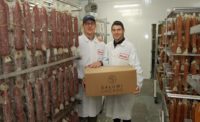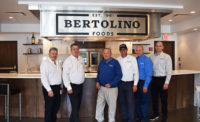A successful business in the meat industry needs good products, a good customer base and a little bit of luck. That last item — luck — can be pretty significant. A natural disaster, a fire, the loss of a key team member — a problem at the wrong time can undo the work of even the highest quality products. Conversely, a chance meeting with the right customer or partner, or the development of a hot new product can launch a company’s good fortunes.
Several years ago, Independent Processor wrote about West Loop Salumi, a high-end charcuterie business that provided fine Chicago restaurants with coppa, pancetta and ‘nduja. Greg Laketek, the founder of the company, had received his training in Parma, Italy, and his Old World-inspired products were a hit.
Sadly, the business did not last. The company’s location, on Randolph Street in downtown Chicago, was small and suffered inventory-destroying floods. There were problems behind the scenes with Laketek and his partners as well. When West Loop Salumi closed, he thought his time in the meat industry had come to a close.
“I thought, we had a great run with salami, it was a lot of fun and would be a fun story to tell. I started looking for other jobs,” he said.
The happy ending to this story is that Laketek’s craftsmanship has resurfaced, in a new location with a more stable business arrangement. Now operating as Salumi Chicago, Laketek works inside Moesle Meat Co. Moesle had been recently acquired by Joel Janecek, and he was introduced to Laketek by a mutual connection. Though Moesle Meats is mainly a pork wholesaler, Janecek had the space in his facility to add on a charcuterie operation. Just as importantly, he had all of the USDA certifications that allowed Laketek to resume his work.
“It’s a clean slate, and I have a partner that’s in it working with me instead of against me,” Laketek says.
Neither Laketek nor Janecek took what would be considered a conventional route into the meat industry. Laketek was a consultant in the defense industry and was looking to transition from a job into a career. He recalled happy childhood memories and delicious meals spent in Italy with his family and decided to book a one-way trip to Parma. He was seeking the skills needed to open the only USDA-approved salumería in Illinois. He found a prospective teacher and visited the man’s restaurant.
“They gave me a tour, and I told them why I was there,” Laketek says. “He told me, ‘You start Monday.’ After that, I was in it, making culatello and a lot of different salami. Then when I was ready I came back with all those recipes and started West Loop Salumi.”
While Laketek was making a name for himself in Chicago’s culinary community, Janecek was preparing to enter the meat industry. He moved to Chicago with a background in finance operations and consulting, with expertise in acquisitions and working with private equity investors.
“I found out through the grapevine that the Moesles were selling their business, but it was too small for a lot of the people I dealt with; it didn’t meet their investment criteria,” he explained.
Moesle Meat Co. was a pork wholesaler and processor that had been located by Chicago’s Fulton Street Market since the 1940s, and it had moved to a new location by the Back of the Yards neighborhood in 1997. Janecek entered into conversations with the three children of the founder to acquire the business himself.
“It took almost 8 or 9 months to convince them to sell their business to me,” Janecek explained, but he eventually bought the business and set about modernizing it.
“A lot of meat companies in Chicago, they missed the technology curve. They’re still on paper,” he says. “That was Step One, and I spent three or four months doing that, putting inventory systems in place and getting stuff automated. Then, I started thinking how do we start to grow the company now that it’s leveragable.”
By then, West Loop Salumi had run its course, and Laketek was looking for his next career move. A mutual acquaintance of the two men found Laketek on LinkedIn. He met with him, introduced him to Janecek, and the two businessmen started talking about how to make Laketek’s charcuterie expertise and Janecek’s pork business fit together. It so happened that he had an unused cooler that could be turned into a drying room and extra space for salami processing.
“I had capacity in my system,” Janecek says. “If you’re trying to launch a business and a product line that takes time, then having capacity is a beautiful thing because we’re able to buffer people over until we can build up enough business, for Salumi Chicago to support itself. We’re finally at that place a year and a half later.”
The road to getting Chicago Salumi operational wasn’t without any complications, as the work needed to turn the cooler into a proper drying room took longer than anticipated, and the equipment needed adjustments. Due to a problem with the clipper and linker, employees had to hand-tie 15,000 pounds of salami. Janecek and Laketek can laugh about it now, but whenever a driver or an employee was available, they’d be given a demo on how to tie. While they hadn’t planned on putting the Moesle employees to work so quickly, it was part of the plan to staff up Salumi Chicago. Rather than hiring people immediately, they supplemented with Moesle’s team until they saw the need for more help. Thanks to demand for the company’s salami, that need came rather quickly.
“We have one full-time person hired, and we’ll have another person dedicated full time to Salumi Chicago, because outside of Greg it’s really been a one-man show,” Janecek explains.
While Laketek was glad to have the extra help, he says he enjoyed the experience of running everything himself during the slow launch in 2018.
“It’s been wild trying to do my office work, do sales, do demo-ing on the weekends and process, but it keeps me busy,” he says.
This new venture has brought benefits that Laketek couldn’t enjoy at his previous business. His drying room alone, for instance, is larger than West Loop’s entire processing area. The equipment is improved, the packaging is improved, and the costs are much improved, thanks to longstanding relationships that Moesle has with pork companies.
“With the buying power that Moesle has, we’re able to get the prices a lot lower with better quality pork. It’s all no-antibiotics-ever, gestation-crate free, 100-percent vegetarian diet. Everything we would want with our pork, they have, and our prices are better than I could ever dream of getting at West Loop,” Laketek says.
Salumi Chicago’s slow launch didn’t stay slow for long. The company’s products are now distributed nationwide, and Laketek says that sales so far are higher than he had ever experienced at his previous business. Many of the distributors that carried his products back then have said that demand for charcuterie has increased greatly since West Loop Salumi was in operation.
“The demand is high, and the market is becoming a little saturated, with everyone and their mom thinking that they can make cured meats, but you can taste the difference,” he says.
“When we relaunched and Greg came back to the market, there was definitely an educational piece we had to do with everybody, whether a customer or a distributor. There are differences in how it’s made and what it’s made with, and people didn’t know what they were eating,” Janecek added.
Salumi Chicago’s products are not made with sugar. That ingredient is more typical of American-style salami, because the sugar drops the pH level quickly, allowing the fermentation process to be completed sooner and the drying rooms to be unloaded and loaded more often. Because of the ingredients Laketek uses and the time he takes in the fermentation process, the salami does not have the sour or acidic tang that people come to expect from the product. The products also have a softer bite. Salumi Chicago sends products across the country to potential customers so they can sample them, but Laketek frequently does in-person demos to help provide the education. It’s time consuming, but very effective in terms of creating new customers. One trip to Washington DC to visit 24 potential customers resulted in 23 new working relationships.
Salumi Chicago has quickly picked up honors and accolades for its products, including a “Chicago’s Best” award for its soppressata and “Charcuterie Masters Gold Award” for its Wagyu bresaola. One of its more recent distributor agreements came with a company that hadn’t expanded its charcuterie category in six years. The processor’s own line of retail products is gaining momentum nationwide, and its capacity allows for larger-scale private-label customers. It could conceivably get to the point that an expansion for Salumi Chicago will have to be put into consideration. Not that the prospect scares Laketek and Janecek. After everything they have gone through to get to this point, they’re not going to be frightened off by potential headaches like that.
“If you don’t have headaches, you’re not really doing anything,” Janecek points out. IP









Report Abusive Comment